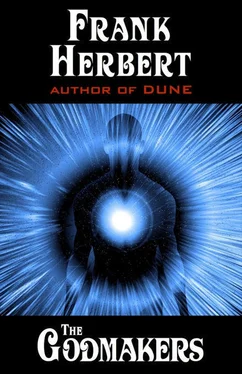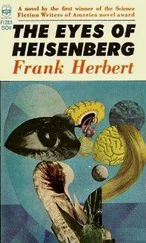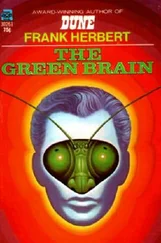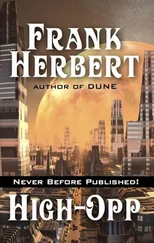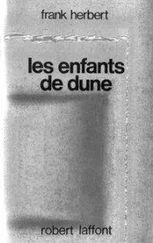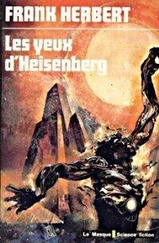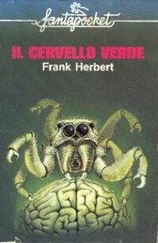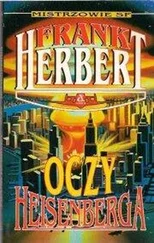Flecks of sand marked the child’s legs and cheeks. One of her red braids hung down partly undone. She appeared angry, shivering with a child’s fury. She stopped about two meters from Orne.
“You did that!” she accused. Orne shuddered at the madness in the child’s voice. “You killed Laurie!” she accused. “It was you.”
“No, Maddie, no,” Orne whispered.
She lifted the bucket, hurled its contents at him. He shut his eyes, felt sand deluge his face, felt the bowl on his head. It ran down his cheeks, fell on his arms, his chest, his lap. He shook his head to dislodge the sand on his cheeks and pain coursed through him as the movement disrupted the microfilaments connected to his scalp.
Through slitted eyes, Orne saw the dancing lines on the green wall leap into wild motion—bending, twisting, flinging. Orne stared at the green and purple frenzy through a red haze of pain. He remembered the priest’s warning that any life he called forth here would contain his own psyche as well as its own.
“Maddie,” he said, “please try to under—”
“You tried to get into my head!” she screamed. “I pushed you out and you can’t get back!”
Bakrish had said it: “Others may reject your half of the creation out of hand.”
Child Maddie had rejected him because her eight-year-old mind could not accept such an experience.
Realizing this, Orne recognized that he was accepting this occurrence as reality and not as hallucination. He thought: What can I say to her? How can I undo this?
“I’m going to kill you!” Maddie screamed.
She hurled herself at him, the toy shovel swinging. Light glinted from the tiny blade. It slashed down on his right arm and pain exploded there. Blood darkened the sleeve of his toga.
Orne felt himself caught up in nightmare. Words leaped to his lips. “Maddie! Stop that or God will punish you!”
She drew back, preparing herself for a new assault.
More movement at the wall caught Orne’s attention. A white-robed figure in a red turban came striding out of the wall: a tall man with gleaming eyes, the face of a tortured ascetic—long gray beard parted in the Sufi style.
Orne whispered the name: “Mahmud!”
A gigantic tri-di of that face and figure dominated the rear wall of the inner mosque Orne had attended on Chargon.
God will punish you!
Orne remembered standing beside an uncle, staring up at that image in the mosque, bowing to it.
Mahmud strode up behind the child, caught her arm as she started another blow with the shovel. She twisted, struggling, but he held her, turning her arm slowly, methodically. A bone snapped. The child screamed and screamed and…
“Don’t!” Orne protested.
Mahmud had a low, rumbling voice. He said: “One does not command God’s agent to stop His just punishments.” He lifted the child by the hair, caught up the fallen shovel, slashed it across her neck.
The screaming stopped. Blood spurted over his gown. He let the now limp figure fall to the floor, dropped the shovel, faced Orne.
Nightmare! Orne thought. This has to be a nightmare!
“You think this is a nightmare,” Mahmud rumbled.
Orne remembered what Bakrish had said: If this creature were real, it could think with his memories. He rejected this thought. “You are a nightmare.”
“Your creation has done its work,” Mahmud said. “It had to be disposed of, you know. It was embodied by hate and not by love. You were warned about that.”
Orne felt guilty, sickened and angry. He recalled that this test involved understanding miracles. “Was this supposed to be a miracle?” he asked. “This was a profound mystical experience?”
“You should’ve talked to the Shriggar,” Mahmud said. “It would’ve discussed cities of glass, the meanings of war, politics and that sort of thing. I will be more demanding. For one thing, I wish to know what you believe constitutes a miracle.”
An air of suspense enclosed Orne. Prescient fear sucked at his vitals.
“What is a miracle?” Mahmud demanded.
Orne felt his heart hammering. He had difficulty focusing on the question, stammered: “Are you really an agent of God?”
“Quibbles and labels!” Mahmud barked. “Haven’t you learned yet about labels? The universe is one thing! We cannot cut it into pieces with our puny expediencies. The universe exists beyond the labels!”
A tingling sense of madness prickled through Orne. He felt himself balanced on the edge of chaos. What is a miracle? he wondered. He recalled Emolirdo’s didactic words: chaos… order… energy. Psi equals miracles.
Words, more words. Where was his faith?
I exist, he thought. That is enough.
“I am a miracle,” he said.
“Ohhh, very good,” Mahmud said. “Psi focus, eh? Energy from chaos shaped into duration. But is a miracle good or evil?”
Orne took a shuddering breath. “I’ve always heard that miracles are good, but they really don’t have to be good or evil. Good and evil relate to motives. Miracles just are.”
“Men have motives,” Mahmud said.
“Men can be good or evil by any definitions they want,” Orne said. “Where’s the miracle in that?”
Mahmud stared down his nose at Orne. “Are you good or evil?”
Orne returned the stare. Winning through this test in his ordeal had taken on a profound meaning for him. He accepted now that this Mahmud was real. What was the prophet trying to make him say?
“How can I be good or evil to myself?” Orne asked.
“Is that your answer?”
Orne felt danger in the question, said: “You’re trying to get me to say that men create gods to enforce their definitions of good and evil!”
“Oh? Is that the source of godliness? Come now, my friend. I know your mind; you have the answer in it.”
Am I good or evil? Orne asked himself. He forced his attention onto the question, but it was like wading upstream in a swift river. His thoughts twisted and turned, showed a tendency to scatter. He said: “I’m… if I’m one with all the universe, then I am God. I am creation. I am the miracle. How can that be good or evil?”
“What is it about creation?” Mahmud demanded. “Answer me that! Stop evading!”
Orne swallowed, recalled the nightmare sequence of this test. Creation? And he wondered if the great psi machine amplified the energy humans called religion.
He thought: Bakrish said I could bring the dead to life here. Religion’s supposed to have a monopoly on that. But how do I separate psi from religion from creation? The original Mahmud’s been dead for centuries. If I have recreated him, how do his questions relate to me? And there was always the possibility this whole thing was some form of hallucination despite the peculiar sense of reality of it.
“You know the answer,” Mahmud insisted.
Pressed to his limits, Orne said: “By definition, a creation may act independently of its creator. You are independent of me even though you partake of me. I have cast you loose, given you your freedom. How can I judge you, then? You cannot be good or evil except in your own eyes. Nor can I!” Exultantly, he demanded: “Am I good or evil, Mahmud?”
“Thou sayest it for thyself and, thereby, are reborn an innocent,” Mahmud said. “Thou hast learned thy lesson and I bless thee for it.”
The robed figure bent, lifted the dead child. There was an odd tenderness in Mahmud’s motions. He turned away, marched back into the writhing green wall. Silence blanketed the room.
The dancing purple lines became almost static, moved in viscous torpor.
Orne felt his body bathed in perspiration. His head ached. His arm throbbed where Maddie had slashed it. His breath came in gasping sobs, as though he had been running.
Читать дальше
